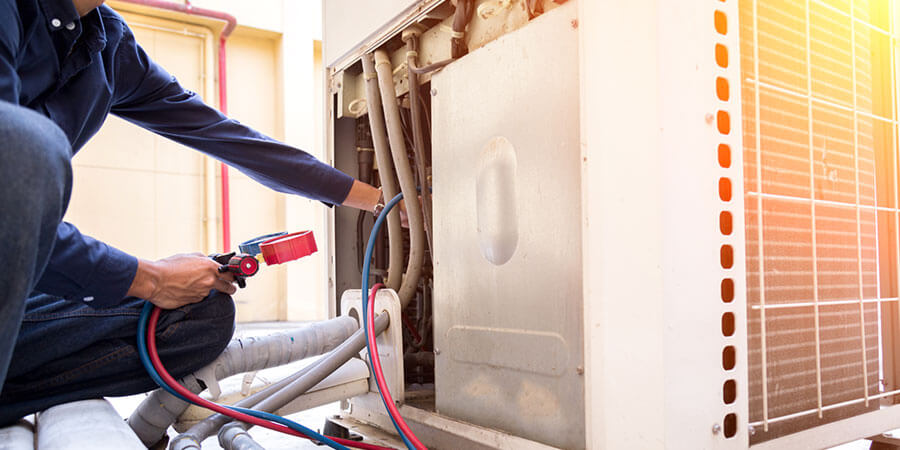Just How to Pick the Right HVAC System for Your Demands
Selecting the suitable Cooling and heating system is an essential choice that needs cautious consideration of different variables. The myriad of system types available can complicate this process, leading one to ask yourself which path inevitably leads to optimal comfort and performance.
Evaluate Your Home Dimension
Assessing your home size is an important very first step in choosing the proper cooling and heating system. The size of your home straight influences the heating & cooling capacity required for reliable environment control. A cooling and heating system that is also tiny will certainly battle to maintain comfortable temperature levels, resulting in increased energy consumption and endure the system. On the other hand, an extra-large system can lead to short cycling, insufficient humidity control, and inefficient procedure.
To precisely examine your home size, gauge the square video of each area, taking into consideration elements such as ceiling height and the design. Furthermore, take into consideration the insulation high quality and the number of windows, as these elements impact thermal efficiency. Homes with open floor strategies might call for different system setups contrasted to those with numerous separated spaces.
Making Use Of the Guidebook J lots computation approach can give a much more accurate estimate of your heating and cooling needs. This technique represent various variables, consisting of local environment, solar gain, and tenancy patterns. By very carefully assessing these aspects, you can ensure that your chosen cooling and heating system is appropriately sized, resulting in boosted convenience, power performance, and durability of the devices.
Determine Your Budget
Determining your budget plan is a pivotal action in the heating and cooling system option procedure, as it establishes the specifications for your alternatives - DMAKS HVAC. A HVAC system is a significant financial investment, and recognizing your monetary limitations will certainly help limit choices that fit within your means
Begin by examining not just the preliminary purchase rate however likewise installation costs, which can differ considerably depending on the intricacy of the project. Consider ongoing expenditures such as upkeep, repair work, and power usage. A system might show up cost effective at first yet can cause higher prices over time if it is much less efficient.
It is recommended to allot a contingency fund for unforeseen costs that might develop during setup or initial system modifications (DMAKS HVAC). Additionally, check out funding alternatives or discounts that may be offered, as these can relieve the worry of upfront expenses
Ultimately, having a clear budget plan allows you to involve with cooling and heating professionals a lot more effectively, ensuring you receive tailored advice that aligns with your economic goals and home needs. By being persistent regarding your budget plan, you can make educated decisions that enhance convenience without compromising monetary security.
Evaluate Energy Performance
Energy efficiency plays a crucial role in the overall efficiency and cost-effectiveness of your Heating and cooling system. Look for systems with a high Seasonal Energy Effectiveness Proportion (SEER) for cooling and a high Annual Fuel Use Efficiency (AFUE) ranking for home heating.
Additionally, consider the Energy Star certification, which signifies that the system meets rigid performance guidelines set by the Epa. Investing in a Power Star-rated a/c system can result in considerable savings in time, especially in locations with severe temperature changes.
One more variable to evaluate is the system's size and capability. An extra-large or undersized device can bring about inadequacy and boosted power costs. DMAKS HVAC. Correct sizing, often identified through a Hand-operated helpful site J lots calculation, ensures that the system operates at optimum effectiveness


Take Into Consideration Environment and Environment
When choosing a heating and cooling system, it is critical to think about the regional environment and environmental problems, as these aspects considerably influence the system's efficiency and effectiveness. Different areas experience differing temperature extremes, moisture degrees, and seasonal changes, all of which effect heating and cooling demands.

Furthermore, neighborhood ecological aspects, such as air high quality and prospective allergens, must inform your choice. Systems equipped with innovative filtering innovations can aid minimize toxins and provide cleaner air. In addition, take into consideration the energy resources offered in your area-- some HVAC systems are extra reliable when powered by gas or renewable power resources.
Inevitably, aligning your HVAC system option with your local environment and ecological factors to consider will lead to enhanced comfort, boosted efficiency, and try here lower energy costs.
Explore System Types and Functions
As house owners seek to maximize convenience and effectiveness, checking out the numerous sorts of cooling and heating systems and their special features becomes necessary. The key kinds of cooling and heating systems consist of central air, warm pumps, ductless mini-split systems, and furnaces. Each system provides distinct advantages tailored to different needs and preferences.
Central air conditioning systems supply consistent air conditioning throughout a home, making them perfect for bigger spaces. Heat pumps work as both home heating and cooling down options, utilizing electrical energy to move heat, which can result in lower energy prices. Ductless mini-split systems are becoming progressively preferred due to their flexibility and convenience of installation, allowing property owners to manage the temperature in private areas without considerable ductwork.

Final Thought
To conclude, selecting the proper HVAC system demands cautious consideration of different factors, consisting of home size, budget restrictions, energy efficiency, local climate, and offered system kinds. A comprehensive assessment of these aspects ensures website link optimal convenience and cost-effectiveness. By following a structured approach, homeowners can make enlightened decisions that line up with their details demands and preferences, eventually leading to improved interior air quality and energy cost savings.